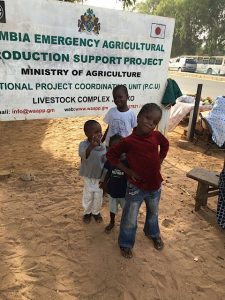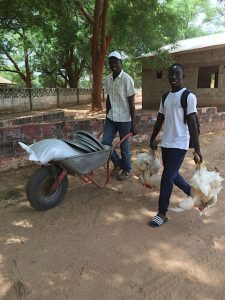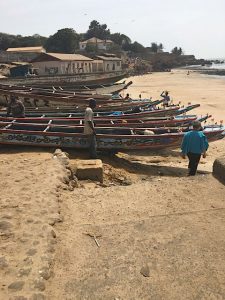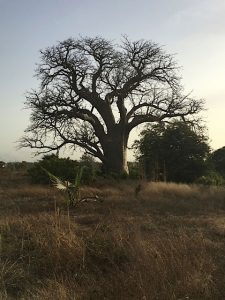Made In Maine: Thoughts on Food, Animals, and Agriculture
World Paradise
By Donald E. Hoenig, VMD, MIM Consulting, University of Maine Faculty Associate, Belfast, Maine
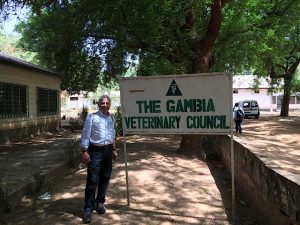 On my second day in The Gambia, West Africa, in May, I was having a conversation with a nice young man who was member of the hotel housekeeping staff and my “mini-bar” guy. He had just refreshed my mini-bar and fixed my cable TV, which was much appreciated. I told him I was from the United States and why I was there. When he found out that I was a veterinarian involved with livestock and poultry, he told me that he owned several goats and hoped someday to move back to the land and farm. He was born in a small rural village up The Gambia River. What he said next really stuck with me. He said, “Don, do you know what they call the United States here in The Gambia? We call it World Paradise.” He called over a fellow worker and said, “What do we call the United States?” And this young man also repeated, “World Paradise.” More about that in a bit.
On my second day in The Gambia, West Africa, in May, I was having a conversation with a nice young man who was member of the hotel housekeeping staff and my “mini-bar” guy. He had just refreshed my mini-bar and fixed my cable TV, which was much appreciated. I told him I was from the United States and why I was there. When he found out that I was a veterinarian involved with livestock and poultry, he told me that he owned several goats and hoped someday to move back to the land and farm. He was born in a small rural village up The Gambia River. What he said next really stuck with me. He said, “Don, do you know what they call the United States here in The Gambia? We call it World Paradise.” He called over a fellow worker and said, “What do we call the United States?” And this young man also repeated, “World Paradise.” More about that in a bit.
The visit to The Gambia was my second to Africa in the past six months. In my last article, I wrote about my trip to Tanzania in November 2015 as part of a World Organization for Animal Health (OIE) development project called the Veterinary Legislation Support Program (VLSP). The VLSP was established in 2008 to help OIE member countries recognize and address their needs for modern, comprehensive veterinary legislation. OIE defines the veterinary domain as “all activities that are directly or indirectly related to animals, their products and by-products, which help to protect, maintain, and improve the health and welfare of humans, including…the protection of animal health and welfare and food safety.” Our team leader was once again Dr. Dorothy Geale, a retired Canadian Food Inspection Agency veterinarian, and our attorney was Julia Rogers, an American who has been living in Rome for the past 15 years.
Our visit took place from April 29 to May 7. We all arrived on April 30 and met our hosts, Drs. Duto Fofana and Ousman Ceesay, at the hotel near Banjul on Sunday May 1, which we discovered was a big holiday — May Day — in The Gambia. Dr. Ceesay is the Chief Veterinary Officer for The Gambia and Dr. Fofana is his boss and the Director General of the Division of Veterinary Services. We also were informed at 10:00 p.m. Sunday evening that the President had declared a national holiday for Monday, May 2. This put a bit of a time crunch on the mission since we had planned to meet with a number of government officials that day.
I won’t go into detail about the political situation in The Gambia (probably a topic for another article), but it was a British protectorate until achieving independence in 1965. Interestingly, the first President after independence was a veterinarian and he ruled the country until the current President deposed him in a bloodless coup in 1994. Of further historical note: if you’ve read or seen the book or TV series Roots you may remember that the main character, Kunta Kinte, (and thousands of other slaves) was born in The Gambia.
- Project site
- The Gambia
- Fishing boats, Banjul, The Gambia
- Baobob tree
Our visit with Gambian Ministry officials was productive, friendly, and enlightening for all of us. Since our report is confidential between the OIE and The Gambia, I really can’t go into details regarding the findings, but I do want to get back to my conversation with the mini-bar guy, Alex. It’s apparent to me, that despite all the deficiencies highlighted during the current bizarre election-year campaign in the U.S., our country remains a shining example of freedom, opportunity, and inspiration to the rest of the world — in Alex’s words, a “World Paradise.”
Elie Wiesel died in July and his words in a 2004 Parade magazine essay also eloquently express this sentiment. “The day I received American citizenship was a turning point in my life,” Wiesel wrote. “From that day on, I felt privileged to belong to a country which, for two centuries, has stood as a living symbol of all that is charitable and decent to victims of injustice everywhere — a country in which every person is entitled to dream of happiness, peace, and liberty; where those who have are taught to give back.”
Dr. Hoenig is a Faculty Associate at the University of Maine. He invites you to submit questions and comments to dochoenigvmd78@gmail.com. Answers to selected questions will appear in future blog posts.

